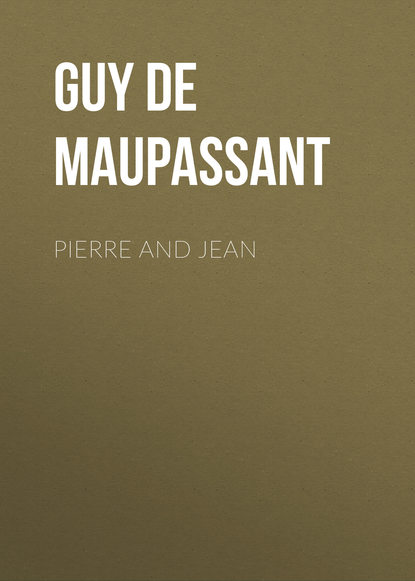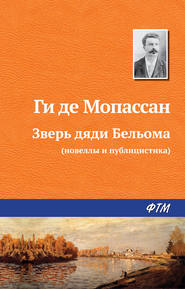По всем вопросам обращайтесь на: info@litportal.ru
(©) 2003-2024.
✖
Pierre and Jean
Настройки чтения
Размер шрифта
Высота строк
Поля
“Oh, it is not for myself. I thought it would be a natural thing to give it to Jean, and that he would be pleased to have it.”
“Yes, you are right; that is a good idea. I will look for it, as soon as I am up.”
And he went out.
It was a blue day without a breath of wind. The folks in the streets seemed in good spirits, the merchants going to business, the clerks going to their office, the girls going to their shop. Some sang as they went, exhilarated by the bright weather.
The passengers were already going on board the Trouville boat; Pierre took a seat aft on a wooden bench.
He asked himself:
“Now was she uneasy at my asking for the portrait or only surprised? Has she mislaid it, or has she hidden it? Does she know where it is, or does she not? If she had hidden it – why?”
And his mind, still following up the same line of thought from one deduction to another, came to this conclusion:
That portrait – of a friend, of a lover, had remained in the drawing-room in a conspicuous place, till one day when the wife and mother perceived, first of all and before any one else, that it bore a likeness to her son. Without doubt she had for a long time been on the watch for this resemblance; then, having detected it, having noticed its beginnings, and understanding that any one might, any day, observe it too, she had one evening removed the perilous little picture and had hidden it, not daring to destroy it.
Pierre recollected quite clearly now that it was long, long before they left Paris that the miniature had vanished. It had disappeared, he thought, about the time that Jean’s beard was beginning to grow, which had made him suddenly and wonderfully like the fair young man who smiled from the picture-frame.
The motion of the boat as it put off disturbed and dissipated his meditations. He stood up and looked at the sea. The little steamer, once outside the piers, turned to the left, and puffing and snorting and quivering, made for a distant point visible through the morning haze. The red sail of a heavy fishing-bark, lying motionless on the level waters, looked like a large rock standing up out of the sea. And the Seine, rolling down from Rouen, seemed a wide inlet dividing two neighbouring lands. They reached the harbour of Trouville in less than an hour, and as it was the time of day when the world was bathing, Pierre went to the shore.
From a distance it looked like a garden full of gaudy flowers. All along the stretch of yellow sand, from the pier as far as the Roches Noires, sun-shades of every hue, hats of every shape, dresses of every colour, in groups outside the bathing huts, in long rows by the margin of the waves, or scattered here and there, really looked like immense bouquets on a vast meadow. And the Babel of sounds – voices near and far ringing thin in the light atmosphere, shouts and cries of children being bathed, clear laughter of women – all made a pleasant, continuous din, mingling with the unheeding breeze, and breathed with the air itself.
Pierre walked among all this throng, more lost, more remote from them, more isolated, more drowned in his torturing thoughts, than if he had been flung overboard from the deck of a ship a hundred miles from shore. He passed by them and heard a few sentences without listening; and he saw, without looking, how the men spoke to the women, and the women smiled at the men. Then, suddenly, as if he had awoke, he perceived them all; and hatred of them all surged up in his soul, for they seemed happy and content.
Now, as he went, he studied the groups, wandering round them full of a fresh set of ideas. All these many-hued dresses which covered the sands like nosegays, these pretty stuffs, those showy parasols, the fictitious grace of tightened waists, all the ingenious devices of fashion from the smart little shoe to the extravagant hat, the seductive charm of gesture, voice, and smile, all the coquettish airs in short displayed on this seashore, suddenly struck him as stupendous efflorescences of female depravity. All these bedizened women aimed at pleasing, bewitching, and deluding some man. They had dressed themselves out for men – for all men – all excepting the husband whom they no longer needed to conquer. They had dressed themselves out for the lover of yesterday and the lover of to-morrow, for the stranger they might meet and notice or were perhaps on the lookout for.
And these men sitting close to them, eye to eye and mouth to mouth, invited them, desired them, hunted them like game, coy and elusive notwithstanding that it seemed so near and so easy to capture. This wide shore was, then, no more than a love-market where some sold, others gave themselves – some drove a hard bargain for their kisses while others promised them for love. All these women thought only of one thing, to make their bodies desirable – bodies already given, sold, or promised to other men. And he reflected that it was everywhere the same, all the world over.
His mother had done what others did – that was all. Others? These women he saw about him, rich, giddy, love-seeking, belonged on the whole to the class of fashionable and showy women of the world, some indeed to the less respectable sisterhood, for on these sands, trampled by the legion of idlers, the tribe of virtuous, home-keeping women were not to be seen.
The tide was rising, driving the foremost rank of visitors gradually landward. He saw the various groups jump up and fly, carrying their chairs with them, before the yellow waves as they rolled up edged with a lace-like frill of foam. The bathing-machines too were being pulled up by horses, and along the planked way which formed the promenade running along the shore from end to end, there was now an increasing flow, slow and dense, of well-dressed people in two opposite streams elbowing and mingling. Pierre, made nervous and exasperated by this bustle, made his escape into the town, and went to get his breakfast at a modest tavern on the skirts of the fields.
When he had finished with coffee, he stretched his legs on a couple of chairs under a lime-tree in front of the house, and as he had hardly slept the night before, he presently fell into a doze. After resting for some hours he shook himself, and finding that it was time to go on board again he set out, tormented by a sudden stiffness which had come upon him during his long nap. Now he was eager to be at home again; to know whether his mother had found the portrait of Marechal. Would she be the first to speak of it, or would he be obliged to ask for it again? If she waited to be questioned further it must be because she had some secret reason for not showing the miniature.
But when he was at home again, and in his room, he hesitated about going down to dinner. He was too wretched. His revolted soul had not yet time to calm down. However, he made up his mind to it, and appeared in the dining-room just as they were sitting down.
All their faces were beaming.
“Well,” said Roland, “are you getting on with your purchases? I do not want to see anything till it is all in its place.”
And his wife replied: “Oh, yes. We are getting on. But it takes much consideration to avoid buying things that do not match. The furniture question is an absorbing one.”
She had spent the day in going with Jean to cabinet-makers and upholsterers. Her fancy was for rich materials, rather splendid to strike the eye at once. Her son, on the contrary, wished for something simple and elegant. So in front of everything put before them they had each repeated their arguments. She declared that a client, a defendant, must be impressed; that as soon as he is shown into his counsel’s waiting-room he should have a sense of wealth.
Jean, on the other hand, wishing to attract only an elegant and opulent class, was anxious to captivate persons of refinement by his quiet and perfect taste.
And this discussion, which had gone on all day, began again with the soup.
Roland had no opinion. He repeated: “I do not want to hear anything about it. I will go and see it when it is all finished.”
Mme. Roland appealed to the judgment of her elder son.
“And you, Pierre, what do you think of the matter?”
His nerves were in a state of such intense excitement that he would have liked to reply with an oath. However, he only answered in a dry tone quivering with annoyance.
“Oh, I am quite of Jean’s mind. I like nothing so well as simplicity, which, in matters of taste, is equivalent to rectitude in matters of conduct.”
His mother went on:
“You must remember that we live in a city of commercial men, where good taste is not to be met with at every turn.”
Pierre replied:
“What does that matter? Is that a reason for living as fools do? If my fellow-townsmen are stupid and ill-bred, need I follow their example? A woman does not misconduct herself because her neighbour has a lover.”
Jean began to laugh.
“You argue by comparisons which seem to have been borrowed from the maxims of a moralist.”
Pierre made no reply. His mother and his brother reverted to the question of stuffs and arm-chairs.
He sat looking at them as he had looked at his mother in the morning before starting for Trouville; looking at them as a stranger who would study them, and he felt as though he had really suddenly come into a family of which he knew nothing.
His father, above all, amazed his eyes and his mind. That flabby, burly man, happy and besotted, was his own father! No, no; Jean was not in the least like him.
His family!
Within these two days an unknown and malignant hand, the hand of a dead man, had torn asunder and broken, one by one, all the ties which had held these four human beings together. It was all over, all ruined. He had now no mother – for he could no longer love her now that he could not revere her with that perfect, tender, and pious respect which a son’s love demands; no brother – since his brother was the child of a stranger; nothing was left him but his father, that coarse man whom he could not love in spite of himself.
And he suddenly broke out:
“I say, mother, have you found that portrait?”
She opened her eyes in surprise.
“What portrait?”
“The portrait of Marechal.”
“No – that is to say – yes – I have not found it, but I think I know where it is.”
“What is that?” asked Roland. And Pierre answered:
“A little likeness of Marechal which used to be in the dining-room in Paris. I thought that Jean might be glad to have it.”
Roland exclaimed:

















